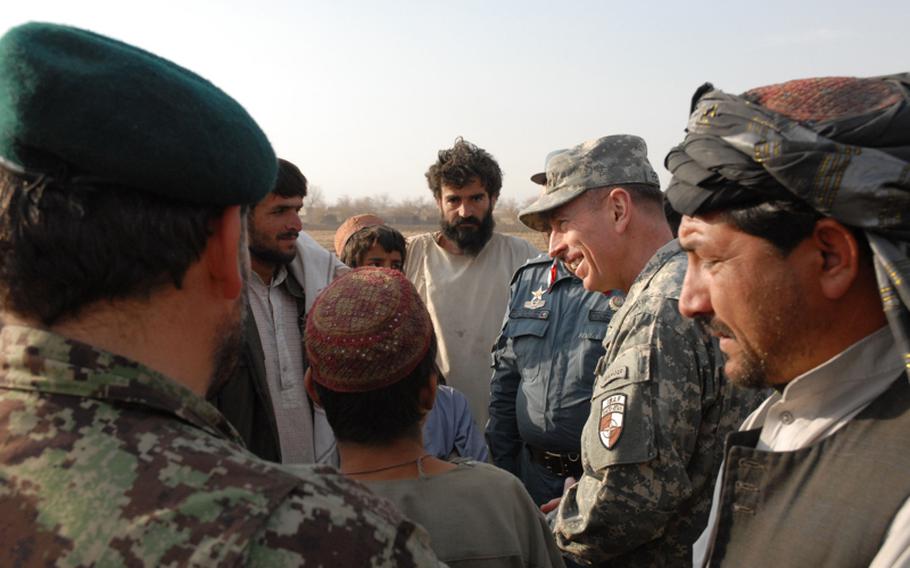
Gen. David Petraeus, commander of the International Security Assistance Force, talks with villagers about the commitments made to Afghanistan as he walked through a village on Monday that had been leveled by the U.S. military in its clearing campaign of the western side of Arghandab district. The Taliban had kicked out the residents of the village, rigged some of the houses to blow and turned the others into homemade bomb factories. The military is now rebuilding the village. (Megan McCloskey/Stars and Stripes)
TAROK KOLACHE, Afghanistan — When the top commander in Afghanistan visited this small village in western Arghandab on Monday, there was nothing more to see than an empty field.
Tarok Kolache currently exists in name only. All its 33 buildings are gone, leveled by the U.S. military in October.
The destruction of the village was necessary to clear the Taliban from this lush farmland, which insurgents had rigged top to bottom with explosives, the military says. And now its reconstruction — and that of three others like it in the area — is just as necessary to keep the Taliban from coming back.
The military is in a perception game, racing the clock to win over villagers before the spring. They’re trying to ensure through rebuilding that when leaves start sprouting on the trees, hailing the start of the traditional fighting season and the return of insurgents, “the people turn them in because they’ve seen something better,” Gen. David Petraeus said.
The locals call this farming area to the northwest of Kandahar City and across the Arghandab River “The Gardens.” The pomegranate and grape farmers had long been kicked out of their homes by the Taliban, and when the massive clearing operations in Kandahar began this fall, the Army found Tarok Kolache and three other villages laden with a sophisticated network of bombs.
After Special Forces raids were unable to take the territory, the military decided it had no choice but to call in close air support to knock the villages down.
Afterward, the locals compared the Americans to the Soviets — just another occupying force.
“These dudes were extremely angry,” said Capt. Patrick McGuigan, the fire support officer for 1st Battalion, 320th Field Artillery Regiment, 2nd Brigade Combat Team, 101st Airborne Division. “The elder (of Tarok Kolache) wouldn’t even talk to me for three weeks, he was that [angry].”
In a twist engineered by the counterinsurgency strategy, McGuigan, the man who had been calling “cleared hot” into the radio to give the jets the go-ahead to blow up the villages, is now in charge of rebuilding them. He has slowly earned the locals’ trust in each of the four villages that need reconstruction from bombings.
In Tarok Kolache, the Army has cleared the rubble and staked out the 13 landowners’ property, creating deeds of ownership that will be registered with the local government. Replacing the buildings and compensating the farmers for their lost revenue from pomegranate sales is going to cost more than $500,000, McGuigan said.
As Petraeus strolled without a flak jacket or helmet Monday along a road near the village, he mingled with the farmers along the way. He was like a politician out on the campaign trail, and his message essentially comes up for a vote when residents decide whether to support the Taliban when the summer draws near.
With a military entourage behind him of ground commanders, both American and Afghan, Petraeus smiled and greeted each man with “salaam alaikum,” and a hand to his heart. He would be quickly surrounded by men, each vying to get their say.
Petraeus listened to their complaints and then turned to the generals and colonels around him to ask what they could do about it.
Some of the farmers said they’d heard the military’s spiel before only to watch coalition forces abandon this traditional Taliban stronghold, and they questioned Petraeus about whether the military would be here for the long term.
“We’ve seen you come and go before,” one farmer told him. “I want to know you’re going to stay.”
Petraeus brought up the commitments pledged at the NATO summit last month to stay in Afghanistan until 2014, and one of the farmers surprised him by nodding and saying, yes, in Lisbon.
When Tarok Kolache’s elder approached with a broad smile, Petraeus embraced him and said “I’m going to tell President Karzai I ran into you when I was out here.”
He assured the elder the military was going to repair all the damage that had been done to his village.
Then, with the elder’s permission, he addressed the crowd that had grown around him, giving them the hard pitch about how he needed their help to keep the area safe when the Taliban came back in the spring, repeatedly saying “with your support.”
“Afghanistan has a truly unique opportunity right now and may never have such an opportunity again,” he told them. “But without security, you’ll never be able to capitalize on that. You’ll never be able to exploit it.”
Before moving along, he turned to the farmer next to him. “Want to walk down the road with us?”